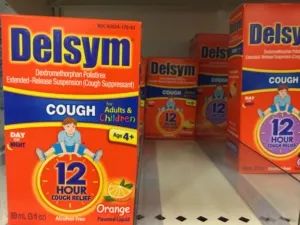Delsym, a common over-the-counter cough suppressant containing dextromethorphan (DMX), is widely used to alleviate coughs associated with respiratory infections. While dextromethorphan has some therapeutic applications in veterinary medicine, such as managing repetitive behaviors in dogs, it poses a significant toxicity risk if ingested by pets. Understanding these risks is crucial for all dog owners to ensure their furry companions’ safety.
 IMG_2036
IMG_2036
It’s important to note that DMX is often found in combination with other ingredients in many human cough and cold medications. If your dog has ingested any medication, it is vital to identify all the active components to accurately assess the potential for toxicity. This comprehensive understanding will guide the necessary veterinary response.
Recognizing the Signs of Dextromethorphan Toxicity in Dogs
When a dog ingests a toxic amount of dextromethorphan, the effects may not be immediate and can develop gradually over several hours. Vigilance is key to identifying potential poisoning. Common signs and symptoms of dextromethorphan toxicity in dogs include:
- Involuntary Muscle Movements: This is a prevalent indicator of DMX poisoning. You might observe twitching or uncontrolled movements.
- Sedation or Agitation: Dogs can exhibit a range of behavioral changes, from extreme drowsiness and lethargy to hyperactivity and restlessness.
- Tremors and Seizures: More severe neurological symptoms can include shaking or more serious seizure activity, which requires immediate veterinary intervention.
- Cardiovascular Changes: The dog’s heart rate can be affected, potentially leading to a faster or slower rhythm than normal.
- Increased Body Temperature: An elevated body temperature can be another sign of intoxication, indicating the body is struggling to cope with the toxic substance.
Determining Potentially Toxic Dextromethorphan Consumption in Dogs
There isn’t a single, universally defined toxic threshold for dextromethorphan in dogs. However, veterinary professionals have established recommended dosage guidelines. For dogs, the generally recommended dose is 2 mg/kg (0.9 mg/lb) of body weight. Any amount exceeding this guideline should be considered potentially toxic and warrants immediate consultation with a veterinarian.
The following table provides a reference for potentially toxic dextromethorphan consumption in dogs based on their weight categories:
| Dogs: Dextromethorphan Potentially Toxic Consumption |
|---|
| X-Small Yorkie, Chihuahua |
| 1 – 10 lbs. (0.45 – 4.6 kg) |
| > 0.9 mg |
What to Do If Your Dog Ingests Delsym or Similar Medication
Accidental ingestion of medications is a common concern for pet owners. If you suspect your dog has consumed Delsym or any other medication containing dextromethorphan, it is crucial to act swiftly and responsibly.
- Contact Your Veterinarian Immediately: This is the most critical step. Do not wait for symptoms to appear. Provide them with all the information you have about the medication ingested, including the active ingredients and the estimated amount consumed.
- Identify All Ingredients: If the medication was in its original packaging, have it handy. List all active ingredients to help the veterinarian assess the complete risk profile. Some medications contain multiple substances that could be harmful to dogs.
- Do Not Induce Vomiting Without Veterinary Guidance: While inducing vomiting might seem like a logical first step, it can be dangerous in certain situations or with specific types of ingested substances. Always follow your veterinarian’s instructions.
- Monitor Your Dog Closely: While waiting for veterinary advice or transport, observe your dog for any developing symptoms. Note any changes in behavior, physical condition, or vital signs to report to the vet.
Prevention is Key
The best approach to managing the risks associated with Delsym For Dogs is prevention. Store all medications, both prescription and over-the-counter, in secure locations that are inaccessible to your pets. Be mindful of where you place them, especially in households with curious or playful dogs. Childproof caps are a good start, but ensuring medications are out of reach entirely is paramount.
By understanding the potential dangers of Delsym and similar medications, and by taking proactive measures to ensure safe storage, dog owners can significantly reduce the risk of accidental ingestion and safeguard their beloved pets from harmful exposures.
References:
- Osweiler, G, et al. (2011). Blackwell’s five-minute veterinary consult clinical companion. Small Animal Toxicology. [Kindle version]. Retrieved from Amazon.com
- Papich MG. Toxicoses from over-the-counter human drugs. Vet Clin North Am Small Anim Pract 1990; 20(2):431-451.
